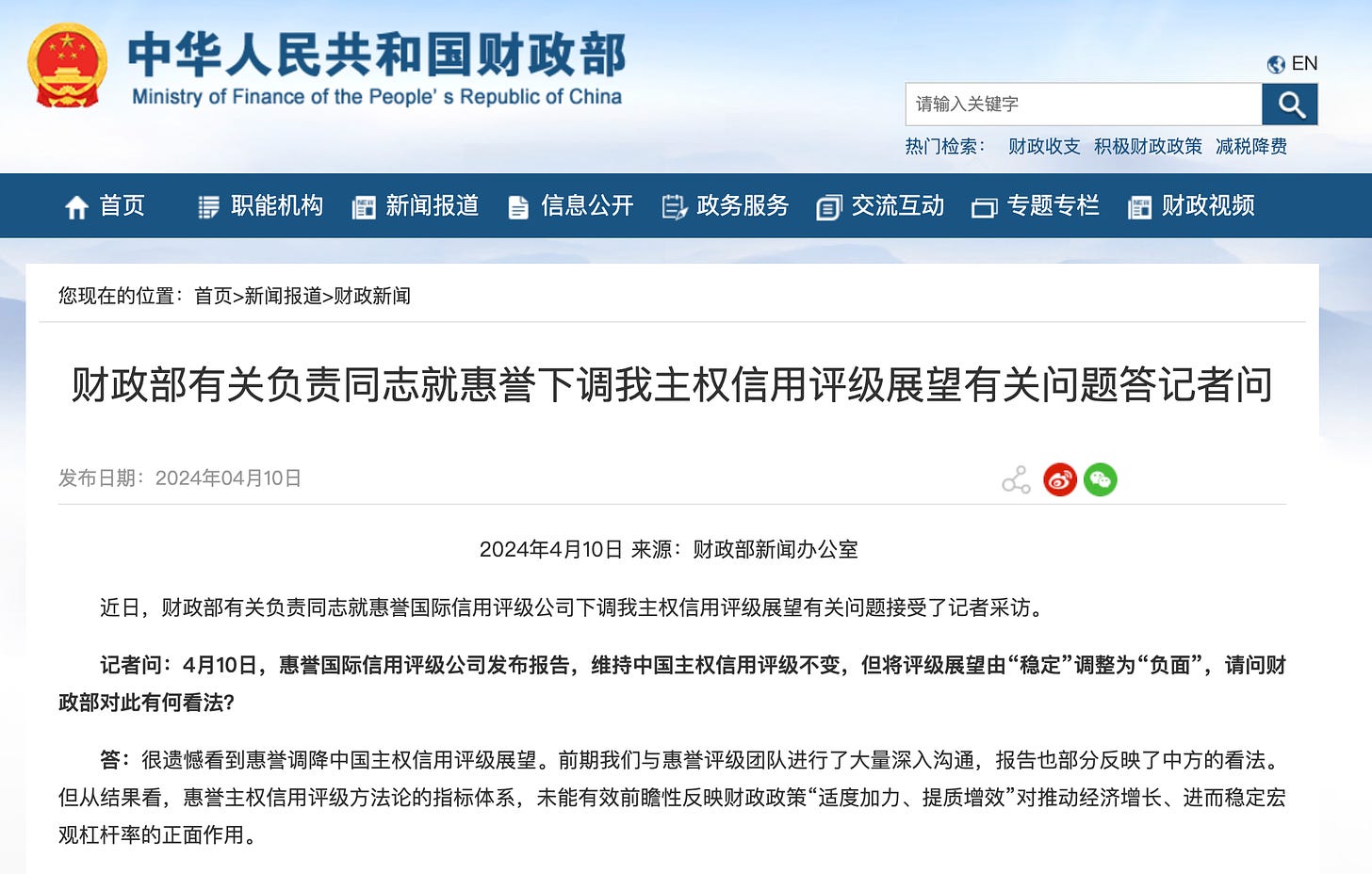Finance Ministry's response to Fitch's downgrade of China's credit outlook
Beijing regrets Fitch's decision, says the methodology did not effectively anticipate the positive impact of China's fiscal policy, and elaborates on local government debt resolution.
Fitch Ratings has just revised the Outlook on China's Long-Term Foreign-Currency Issuer Default Rating (IDR) to Negative from Stable, and affirmed the IDR at 'A+'. Below is the response from China’s Ministry of Finance, translated from the Chinese version.
Recently, a senior official from the Ministry of Finance addressed reporters' inquiries concerning Fitch Ratings' downgrade of China's sovereign credit rating outlook.
Reporter: On April 10, Fitch Ratings released a report that maintains China's sovereign credit rating but adjusted the outlook from "stable" to "negative". What is the Ministry of Finance's view on this?
Response: We regret to see Fitch's downgrade of the outlook for China's sovereign credit rating. Prior to this, we had extensive and in-depth communication with the Fitch ratings team, and the report partly reflects our perspective. However, the result shows Fitch’s methodology did not effectively anticipate the positive impact of fiscal policy “适度加力、提质增效” "increasing efforts moderately, enhancing quality and efficiency" on economic growth and thereby stabilizing the macro leverage ratio.
In the long term, maintaining a moderate deficit size and making good use of valuable debt funds are beneficial for expanding domestic demand, supporting economic growth, and ultimately maintaining good sovereign credit. The Chinese government has always been committed to balancing multiple objectives: supporting economic development, preventing fiscal risks, and achieving fiscal sustainability. Based on changes in the situation, balancing needs and possibilities, the government arranges the deficit size scientifically and reasonably, keeping the deficit rate at a reasonable level. The deficit rate for 2024 is set at 3%, which is moderate and reasonable, conducive to stable economic growth, and can also better control the government debt ratio, reserving policy space for future risks and challenges.
Looking back at 2023, China's GDP grew by 5.2%, contributing more than 30% to the world economy, which is encouraging. This year, setting a target of around 5% aligns with current conditions and development needs, conveying a determination and confidence for high-quality development. The long-term positive trend of China's economy has not changed, nor has the Chinese government's ability and determination to maintain good sovereign credit.
Reporter: Fitch pays close attention to fiscal sustainability issues, expressing concerns about rising risks from fiscal deficits, local government debts, and financing platform debts. Could you elaborate on the work and considerations in this regard?
Response: As I mentioned, an appropriate fiscal deficit is beneficial for leveraging the positive role of government debt financing, maintaining necessary support for high-quality economic and social development. In 2024, the national fiscal deficit is planned at 4.06 trillion yuan, an increase of 180 billion yuan from the initial budget of the previous year, with an expected deficit rate of 3%, the same as the initial budget of the previous year. Such an arrangement helps maintain necessary spending intensity, plays a counter-cyclical fiscal role, stabilizes and boosts market confidence, and is also beneficial for coordinating development and security, preventing government debt risks, and leaving space for later response to complex and difficult situations.
In terms of preventing and resolving local government debt risks, in recent years, the Ministry of Finance, in conjunction with relevant parties, has resolutely implemented the decisions and arrangements of the Central Committee (of the Communist Party of China), placing risk prevention and the promotion of sustainable fiscal development in a prominent position. A series of policy measures have been introduced, continuously improving the management of statutory local government debt, actively and prudently resolving the risks of implicit local government debt. Relevant departments and local party committees and governments have further intensified their efforts, adopting more substantial and effective measures, achieving positive results.
The Ministry of Finance arranges a certain scale of government bonds to raise funds for refinancing, within the local government debt limit space, supporting local governments, especially high-risk areas, in resolving implicit debt of financing platforms and clearing government arrears to enterprises, easing the pressure of concentrated debt repayment due and reducing interest expenditure burden.
Following the principle of 省负总责,市县尽全力化债 "provincial governments bear overall responsibility, municipal and county-level governments spare no effort in debt resolution," local governments rely on their efforts, coordinating various resources, formulating debt resolution plans, and specifying concrete measures item by item. Through the collaborative efforts of all parties, local debt risks have been overall mitigated. The effective guarantee of repayment of principal and interest on statutory local government debt, the gradual decrease in the scale of implicit debt, the progress in clearing government arrears to enterprises, and the reduction in the number of local financing platforms indicate that, overall, China's local government debt resolution work is orderly progressing, and the risks are generally controllable.
Next, the Ministry of Finance will resolutely implement the decisions and arrangements of the Central Committee (of the CPC), strengthen control at the origin, combine long-term and short-term measures, “block and dredge” simultaneously, treat both symptoms and root causes, continuously strengthen the management of statutory local government debt, further promote the effective implementation of a comprehensive debt resolution plan, strictly supervise and hold accountable for rule-breaking and illegal debt-raising issues, work to build a long-term mechanism for preventing and resolving hidden debt risks, accelerate the establishment of a government debt management mechanism compatible with high-quality development, and gradually resolve local government debt risks within the context of high-quality development.





